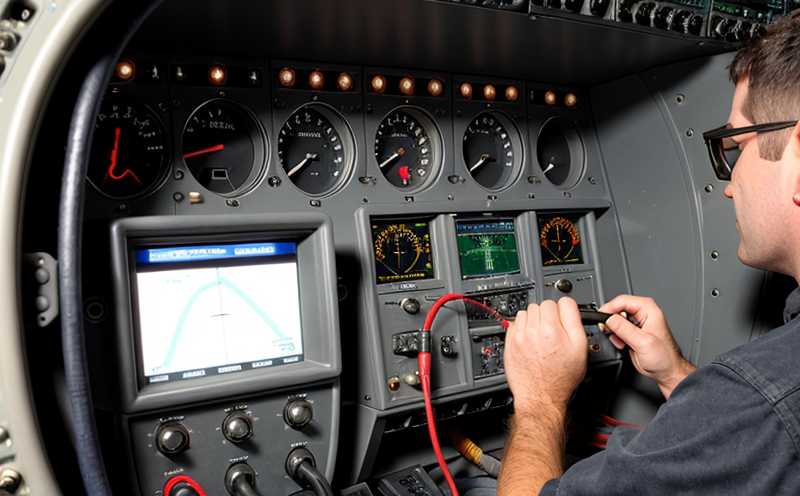EASA CS-ETSO Avionics Equipment Certification Testing
The European Union Aviation Safety Agency (EASA) CS-ETSO regulation is pivotal for certifying avionics equipment in commercial aviation. This service ensures that the electronic and electrical components used within aircraft adhere to the stringent safety, reliability, and performance standards set forth by EASA.
Avionics systems are critical to flight operations, encompassing navigation, communication, engine monitoring, and control functions. They must be thoroughly tested for their ability to function in a variety of environments and under diverse operational conditions. The EASA CS-ETSO regulation mandates that all avionics equipment undergoes rigorous testing to ensure it meets the highest safety standards.
The certification process involves multiple stages, including environmental stress screening (ESS), vibration testing, shock testing, and electromagnetic compatibility (EMC) assessments. These tests are designed to identify potential weaknesses in design or manufacturing processes before they become critical issues during flight operations. The ESS is a crucial step where equipment undergoes thermal cycling, humidity exposure, and high-voltage conditioning to simulate the rigors of real-world conditions.
Vibration testing simulates the mechanical stress experienced by avionics systems in-flight, ensuring that they can withstand these forces without failure. Shock tests replicate sudden impacts from turbulence or landing scenarios, verifying structural integrity. EMC assessments are critical for ensuring that equipment does not interfere with other onboard systems and is not susceptible to external interference.
The testing process also includes functional testing, which verifies the operational parameters of each component within specified limits. This ensures that all parts function correctly under normal operating conditions. Additionally, environmental stress screening helps identify any latent defects early in the production lifecycle. The rigorous nature of these tests guarantees that only reliable and safe equipment is placed into service.
Compliance with EASA CS-ETSO standards not only enhances safety but also supports regulatory compliance requirements for operators and manufacturers. This certification process ensures that all avionics systems meet the necessary technical and functional criteria, thereby protecting both passengers and crew from potential hazards.
Our laboratory provides comprehensive testing services to support this certification process. Our experts use state-of-the-art equipment and follow international standards such as EASA, IEC, and MIL-SPEC protocols. By leveraging our expertise and facilities, we ensure that every component undergoes thorough evaluation before being certified.
The importance of this testing cannot be overstated in the aviation industry. A single failure in avionics can lead to catastrophic consequences. Our commitment is to provide accurate, reliable, and timely results that meet or exceed EASA CS-ETSO requirements. This ensures that operators have confidence in their equipment's performance and reliability.
In summary, our service aims to provide comprehensive testing solutions for avionics equipment certification under EASA CS-ETSO standards. Our rigorous approach ensures that all components are thoroughly evaluated, thus enhancing the overall safety and reliability of aircraft systems.
Benefits
- Enhanced Safety: Rigorous testing ensures that avionics equipment meets stringent safety requirements, thereby protecting passengers and crew.
- Regulatory Compliance: Certification under EASA CS-ETSO aligns with international regulatory standards, ensuring compliance for operators and manufacturers.
- Increased Reliability: Testing identifies potential issues early in the production lifecycle, reducing the risk of failures during flight operations.
- Improved Reputation: Compliance with industry best practices enhances the reputation of both equipment manufacturers and operators.
The benefits extend beyond mere compliance; they contribute to a safer and more efficient aviation industry. By adhering to these standards, we support the ongoing efforts towards maintaining high levels of safety in commercial aviation.
Why Choose This Test
Selecting EASA CS-ETSO certification testing is essential for avionics equipment manufacturers and operators seeking robust regulatory compliance. Our laboratory offers a full suite of services, including environmental stress screening (ESS), vibration testing, shock testing, and electromagnetic compatibility (EMC) assessments.
Environmental stress screening subjects the equipment to extreme conditions such as temperature changes, humidity exposure, and voltage surges. This process helps identify any latent defects that could potentially lead to failures during critical phases of flight. Vibration testing replicates the mechanical stresses experienced by avionics systems in-flight, ensuring they can withstand these forces without compromising performance.
Shock tests simulate sudden impacts from turbulence or landing scenarios, verifying the structural integrity and operational capability of the equipment. EMC assessments ensure that the equipment does not interfere with other onboard systems and is immune to external electromagnetic interference. These comprehensive tests provide a holistic view of the equipment's reliability and safety under various operating conditions.
Our laboratory adheres strictly to international standards such as EASA, IEC, and MIL-SPEC protocols. This ensures that our testing methods are consistent with global best practices. Our team of experts uses cutting-edge equipment and methodologies, providing accurate and reliable results.
The choice of EASA CS-ETSO certification testing is not just about compliance; it's about delivering a high level of safety and reliability in aviation systems. By choosing us, you ensure that your avionics equipment meets the highest standards, thereby contributing to safer flight operations.





